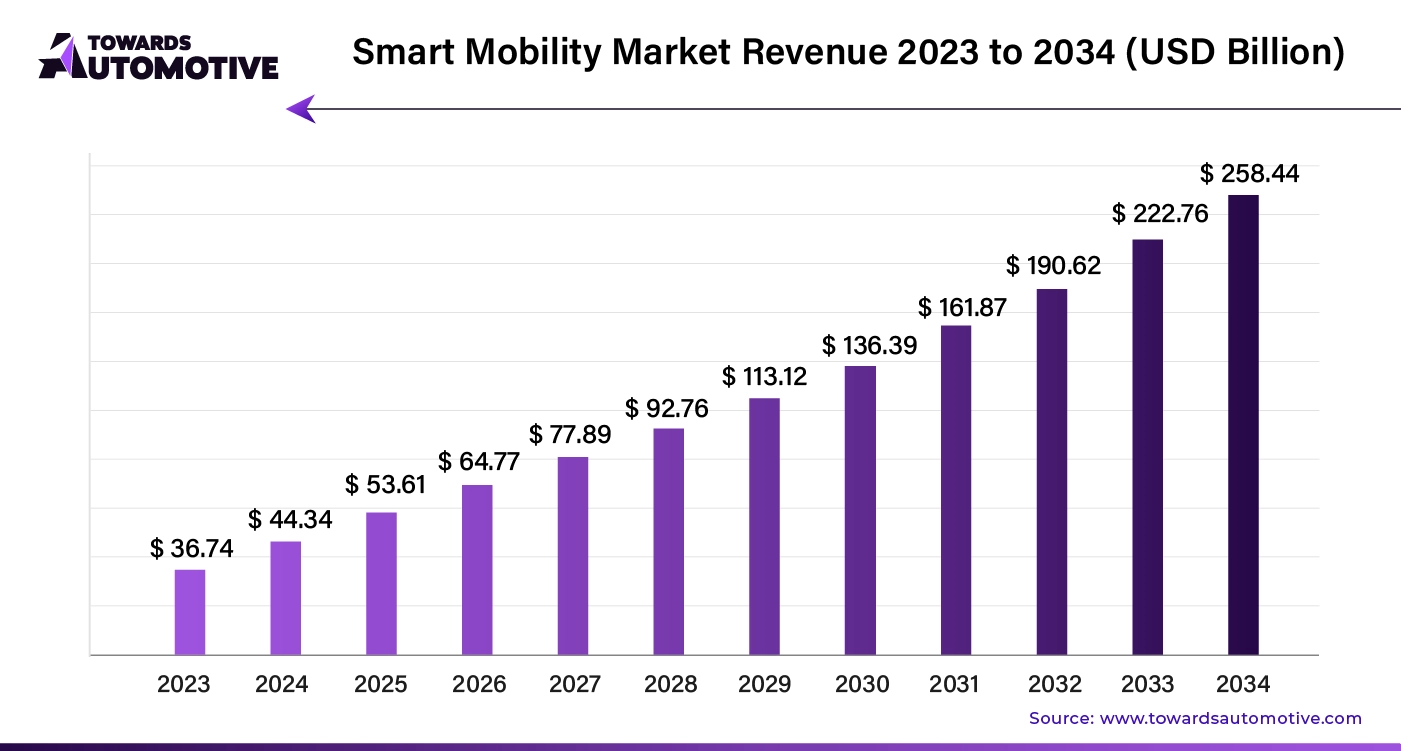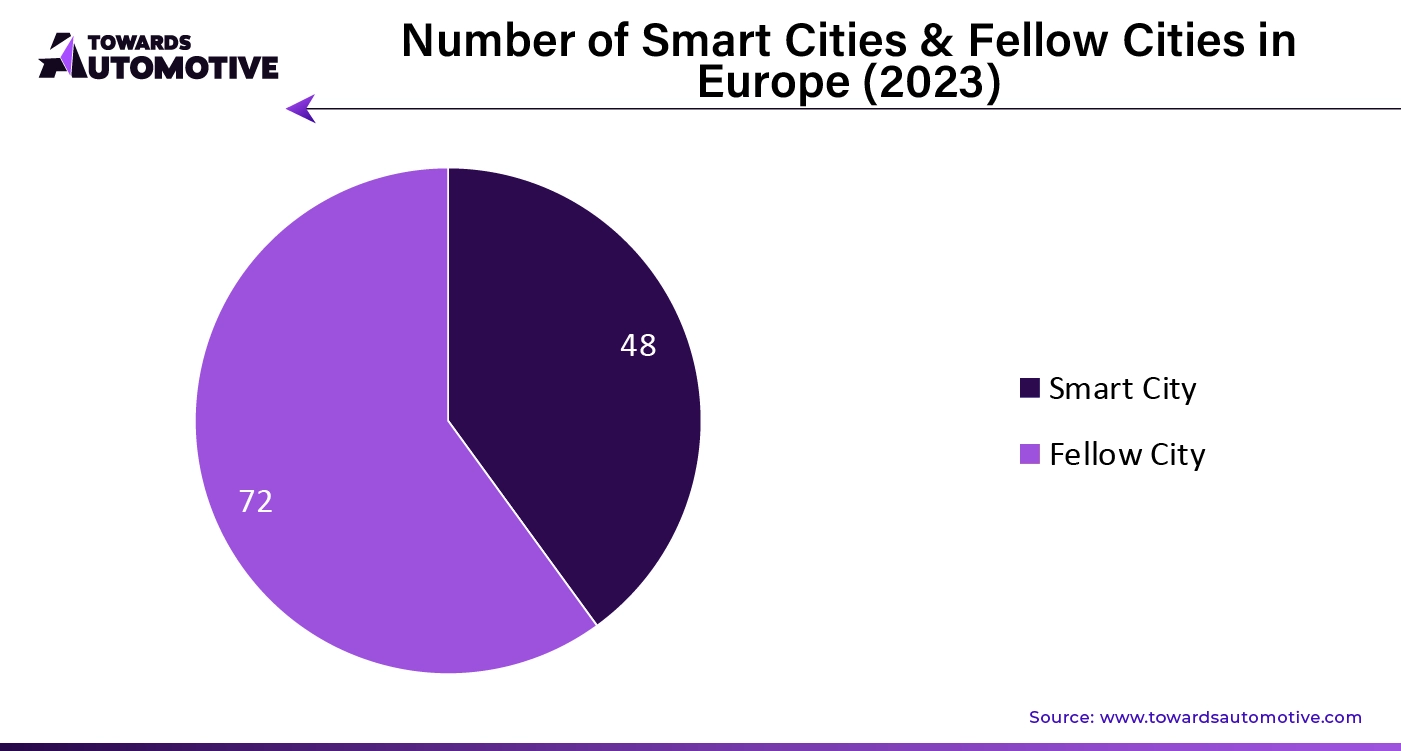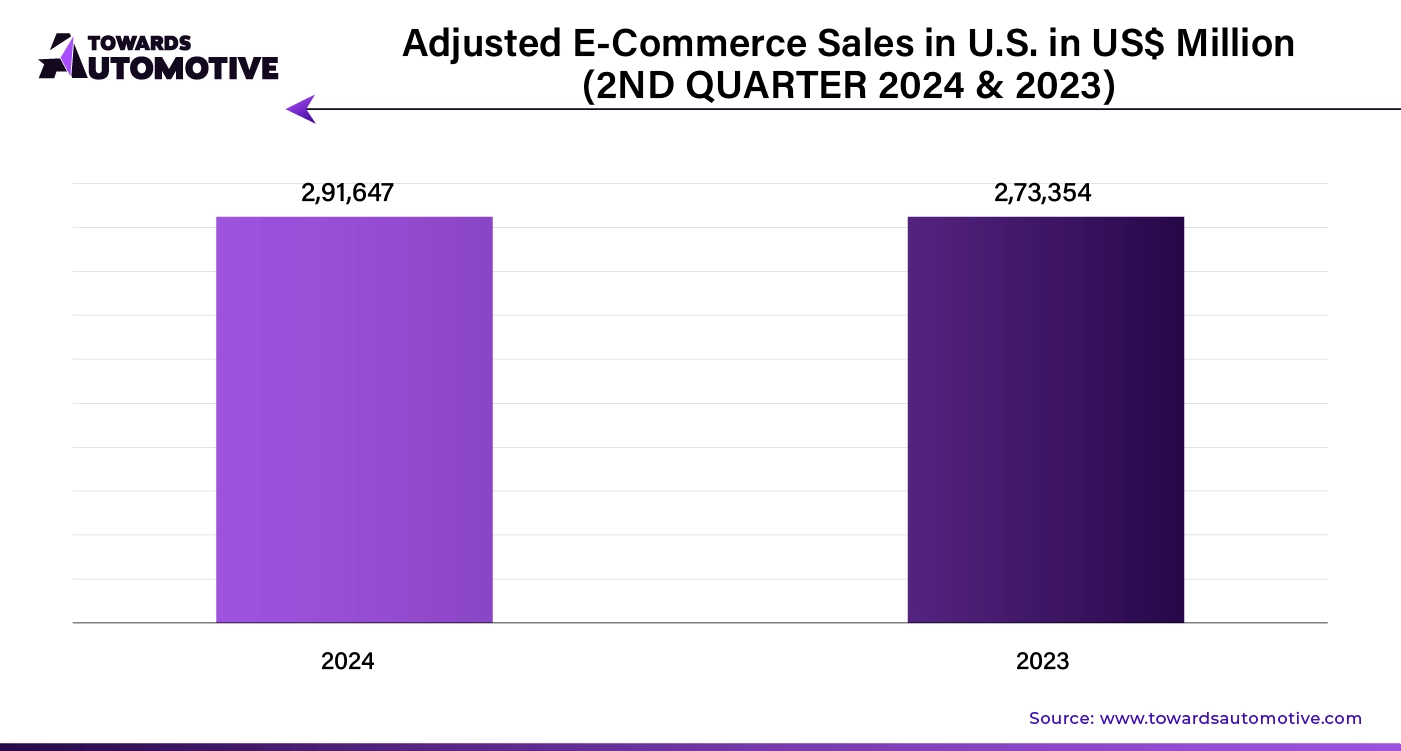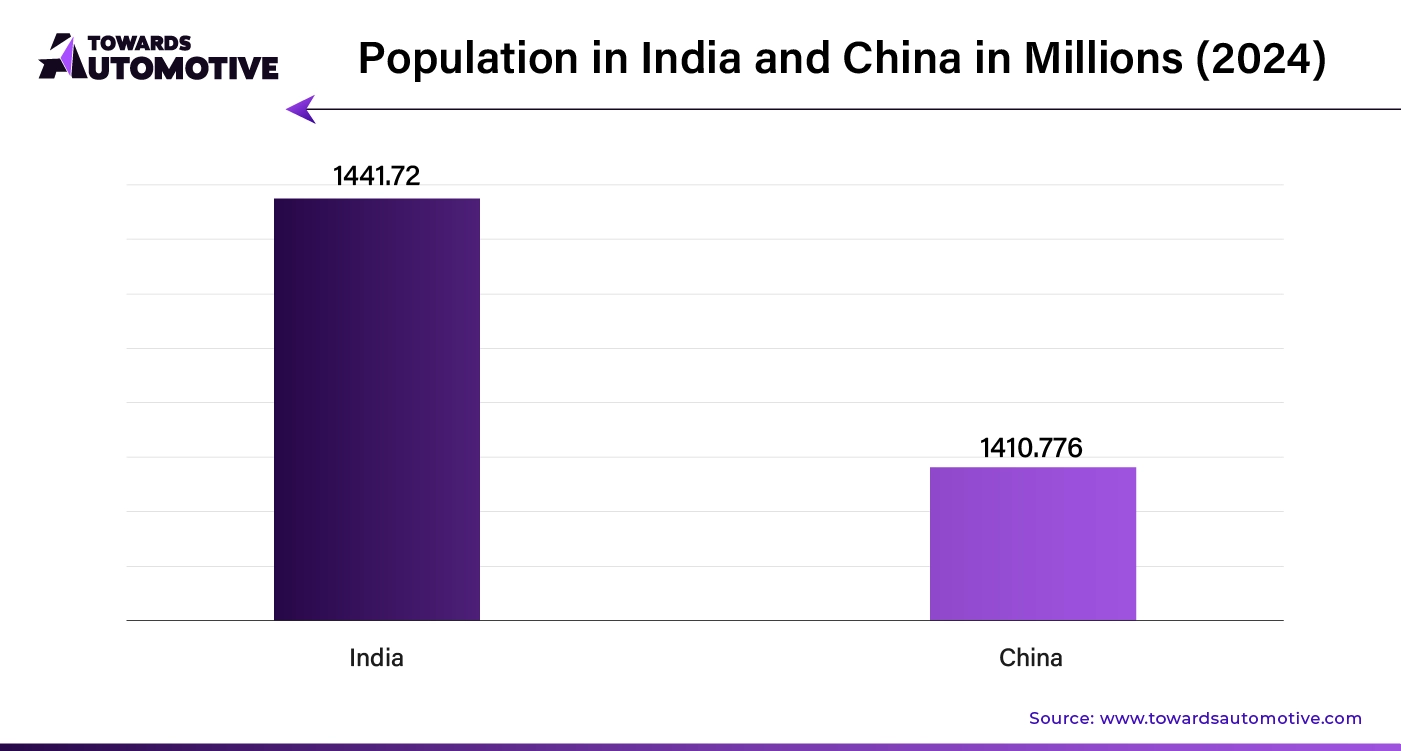April 2025
The global smart mobility market size is calculated at USD 44.34 billion in 2024 and is expected to be worth USD 258.44 billion by 2034, expanding at a CAGR of 20.64% from 2024 to 2034.

Unlock Infinite Advantages: Subscribe to Annual Membership
The Smart Mobility market is evolving rapidly, driven by the increasing demand for efficient, sustainable, and connected transportation solutions. As urbanization accelerates and traffic congestion becomes a growing concern, smart mobility technologies offer innovative solutions to transform how people and goods move within and between cities. This market encompasses a wide range of advancements, including connected vehicles, intelligent transportation systems (ITS), electric and autonomous vehicles, and integrated public transit solutions. These technologies aim to enhance transportation efficiency, reduce environmental impact, and improve overall quality of life.
Smart mobility solutions leverage data analytics, artificial intelligence (AI), and Internet of Things (IoT) connectivity to optimize traffic management, streamline public transportation, and enable seamless multi-modal travel. By integrating real-time information and advanced communication systems, smart mobility initiatives improve route planning, reduce travel times, and minimize congestion. Additionally, the focus on sustainability drives the adoption of electric and hybrid vehicles, contributing to a reduction in carbon emissions and promoting greener urban environments.
As cities and governments increasingly prioritize smart infrastructure and sustainable transportation, the Smart Mobility market is set for significant growth, offering transformative solutions to meet the evolving needs of modern transportation.
Artificial Intelligence (AI) plays a pivotal role in the Smart Mobility market by driving advancements that enhance transportation efficiency, safety, and user experience. AI technologies are integral to the development and operation of connected and autonomous vehicles, where they enable sophisticated decision-making and real-time processing of vast amounts of data. In autonomous vehicles, AI algorithms analyze data from sensors and cameras to navigate, avoid obstacles, and make complex driving decisions, paving the way for safer and more reliable self-driving cars.
AI also enhances intelligent transportation systems (ITS) by optimizing traffic management and reducing congestion. Through machine learning and predictive analytics, AI can analyze traffic patterns, predict peak congestion times, and dynamically adjust traffic signals to improve flow and reduce delays. Additionally, AI-driven platforms facilitate seamless integration of various transportation modes, providing users with real-time updates, route recommendations, and personalized travel experiences.
In public transit, AI enables smarter scheduling and route planning by analyzing passenger data and optimizing service efficiency. Overall, AI's role in the Smart Mobility market is crucial for creating a more connected, efficient, and sustainable transportation ecosystem, driving innovation and transforming how people and goods move within urban environments.
In August 2024, Parsons launched iNET. iNET is an AI-based smart mobility solution that comes with advanced features to optimize transportation system and enhances cyber security.
The rise in smart city projects is significantly driving growth in the Smart Mobility market, as cities around the world increasingly embrace advanced technologies to enhance urban living and transportation systems. Smart city initiatives focus on integrating digital technologies and data-driven solutions to improve infrastructure, optimize resource management, and create more sustainable and efficient urban environments. Central to these projects is the development of smart mobility solutions, which leverage technologies such as connected vehicles, intelligent transportation systems, and integrated public transit to address the challenges of urban congestion and pollution.
As cities invest in smart infrastructure, they are implementing advanced mobility solutions that improve traffic management, streamline public transportation, and support the deployment of electric and autonomous vehicles. These initiatives aim to reduce travel times, minimize environmental impact, and enhance overall quality of life for residents. The growth of smart city projects creates a favorable environment for the expansion of the Smart Mobility market, driving innovation and adoption of cutting-edge technologies. By integrating smart mobility solutions into urban planning, cities are setting the stage for a more connected, efficient, and sustainable transportation ecosystem, further propelling the advancement of the Smart Mobility market.

The Smart Mobility market faces several constraints that can impact its growth, including high implementation costs, technological complexities, and data privacy concerns. The initial investment required for advanced infrastructure, connected vehicles, and intelligent transportation systems can be significant, posing a barrier for many cities and organizations. Additionally, the integration of diverse technologies and systems can present technical challenges and interoperability issues. Data privacy and security concerns also arise as smart mobility solutions collect and analyze vast amounts of personal and operational data, necessitating robust safeguards to protect sensitive information.
The growth of Mobility-as-a-Service (MaaS) is creating significant opportunities in the Smart Mobility market, as it fundamentally transforms how people access and experience transportation. MaaS integrates various modes of transport—such as public transit, ride-sharing, bike-sharing, and car rentals—into a unified, user-centric platform, offering a seamless and flexible travel experience. This integration is driven by advancements in digital technology, data analytics, and connectivity, which enable real-time information, personalized travel options, and efficient route planning.
As cities and municipalities increasingly adopt MaaS solutions, there is a growing demand for smart mobility technologies that facilitate the coordination and optimization of diverse transportation services. MaaS platforms enhance the efficiency of urban transit networks, reduce the reliance on private car ownership, and support more sustainable transportation choices. This shift not only improves urban mobility but also stimulates innovation and investment in supporting technologies, such as smart ticketing systems, advanced analytics, and integrated mobility platforms.
The expansion of MaaS presents a range of opportunities for stakeholders in the Smart Mobility market, including technology providers, transportation operators, and urban planners. By aligning with MaaS trends, these players can capitalize on the evolving needs of modern travelers and contribute to the development of more connected, efficient, and sustainable transportation ecosystems.
In January 2024, the government of Athens launched Maas Project. This project is designed for modernizing the overall public transportation system in Athens, Greece.
The ride sharing segment held the largest share of the market. The ride-sharing segment is a major driver of growth in the Smart Mobility market, significantly reshaping urban transportation dynamics and contributing to more efficient and flexible mobility solutions. Ride-sharing services, facilitated by advanced mobile applications and GPS technology, provide a convenient and cost-effective alternative to traditional taxi services and personal vehicle ownership. By connecting passengers with drivers through seamless digital platforms, ride-sharing enhances the accessibility and efficiency of transportation, reducing the need for private car ownership and lowering traffic congestion.
The proliferation of ride-sharing services is driven by growing consumer demand for on-demand, personalized transportation options and the desire for more sustainable travel solutions. These services support smart mobility initiatives by integrating with other modes of transport, such as public transit and bike-sharing systems, to offer comprehensive, multi-modal travel solutions. Additionally, ride-sharing contributes to reduced vehicle emissions by promoting carpooling and optimizing vehicle usage, aligning with broader sustainability goals.
As ride-sharing platforms continue to evolve, incorporating features like autonomous vehicles and electric cars, they further drive innovation in the Smart Mobility market. This segment's expansion creates new opportunities for technology providers, transportation operators, and urban planners, contributing to the development of more connected, efficient, and sustainable transportation ecosystems.
The parking management segment dominated the market. The parking management segment is a key driver of growth in the Smart Mobility market, as it addresses the increasing demand for efficient, convenient, and technology-driven parking solutions in urban environments. Advanced parking management systems leverage smart technologies, including sensors, IoT connectivity, and data analytics, to optimize the use of available parking spaces and streamline the parking experience for drivers. These systems enable real-time monitoring of parking availability, dynamic pricing, and automated payment processes, reducing the time spent searching for parking and minimizing congestion caused by vehicles circling for spaces.
The rise of smart parking solutions aligns with the broader goals of smart mobility, which seek to enhance overall transportation efficiency and improve urban livability. By integrating parking management with other smart city infrastructure and transportation services, these systems contribute to more effective traffic management, reduced emissions, and a smoother flow of vehicles within cities. Additionally, advancements such as automated parking systems and app-based parking reservations further drive innovation in this segment.
As cities continue to evolve and face growing challenges related to urban mobility, the parking management segment's contributions are crucial for developing more efficient, connected, and sustainable transportation ecosystems. This growth creates opportunities for technology providers and urban planners to deliver integrated solutions that meet the needs of modern urban environments.
The RFID segment accounted for the largest share of the industry. The RFID segment plays a crucial role in driving the growth of the Smart Mobility market by revolutionizing how transportation and logistics systems operate. Radio Frequency Identification (RFID) technology enhances various aspects of smart mobility through its ability to enable seamless, automated data exchange between objects and systems. In transportation, RFID is utilized for efficient vehicle tracking, automated toll collection, and streamlined parking management, significantly improving operational efficiency and user convenience. The technology facilitates real-time monitoring and management of assets, such as vehicles and cargo, enhancing logistics and supply chain operations.
RFID systems support smart mobility initiatives by integrating with other smart city infrastructure, such as intelligent transportation systems and connected vehicle networks. This integration allows for better coordination and optimization of transportation resources, contributing to reduced traffic congestion and improved traffic flow. Additionally, RFID enhances security and accuracy in transportation operations, from verifying vehicle identities to managing access control.
As cities and transportation networks become more connected and data-driven, the adoption of RFID technology is accelerating, driving innovation and efficiency in smart mobility solutions. This growth creates opportunities for technology providers and urban planners to develop and implement advanced solutions that support the evolving needs of modern transportation systems and contribute to more sustainable and effective urban mobility.
North America dominated the smart mobility market. Advancements in Vehicle-to-Everything (V2X) communication, rising e-commerce and logistics needs, and growing environmental concerns are pivotal drivers of the Smart Mobility market's growth in North America. V2X communication technology, which enables vehicles to interact with surrounding infrastructure, other vehicles, and pedestrians, is enhancing transportation efficiency and safety. By facilitating real-time data exchange, V2X improves traffic management, reduces congestion, and supports the development of autonomous vehicles, contributing significantly to smarter, more responsive transportation networks.
Simultaneously, the surge in e-commerce and the associated logistics requirements are fueling the adoption of smart mobility solutions. The demand for faster, more reliable delivery services is driving innovations such as autonomous delivery vehicles and advanced fleet management systems. These solutions help optimize delivery routes, manage fleet operations more efficiently, and address the increasing volume of goods being transported, ultimately enhancing the efficiency of supply chains and logistics operations.
Environmental concerns and sustainability goals are also crucial factors driving the market. There is an increasing emphasis on reducing carbon emissions and promoting eco-friendly transportation options. Smart mobility solutions, including electric vehicles (EVs), car-sharing programs, and enhanced public transit systems, align with these sustainability goals by offering greener alternatives to traditional transportation methods. These advancements not only contribute to reducing environmental impact but also support the broader objectives of creating more sustainable urban environments.

Asia Pacific is expected to grow with the highest CAGR during the forecast period. Urbanization and population growth, technological advancements along with consumer demand for connected services are pivotal factors driving the growth of the Smart Mobility market in Asia Pacific. The rapid urbanization in the region, characterized by expanding cityscapes and increasing population density, creates significant challenges for traditional transportation systems. Smart mobility solutions, such as intelligent transportation systems and integrated public transit, are essential for managing traffic congestion, reducing travel times, and improving overall urban mobility. These solutions help cities cope with the demands of growing populations and the need for efficient transportation infrastructure.
Technological advancements are also fueling the market’s expansion. Breakthroughs in artificial intelligence (AI), Internet of Things (IoT), and 5G connectivity enable the development of advanced smart mobility technologies. These innovations support connected vehicles, real-time traffic management, and autonomous driving, enhancing transportation efficiency and safety. As technology evolves, smart mobility solutions become more sophisticated and capable of addressing complex urban transportation challenges.
Additionally, rising consumer demand for connected services drives the adoption of smart mobility solutions. Today’s consumers seek more convenience, connectivity, and personalized experiences in their travel options. Integrated mobility platforms, real-time updates, and seamless multi-modal transport options cater to these preferences, making transportation more user-friendly and efficient. This demand encourages the development and implementation of smart mobility solutions that enhance the overall travel experience.

By Offering
By Solution Type
By Technology
By Region
April 2025
March 2025
March 2025
March 2025
We offer automotive expertise for market projections and customizable research, adaptable to diverse strategic approaches.
Contact Us